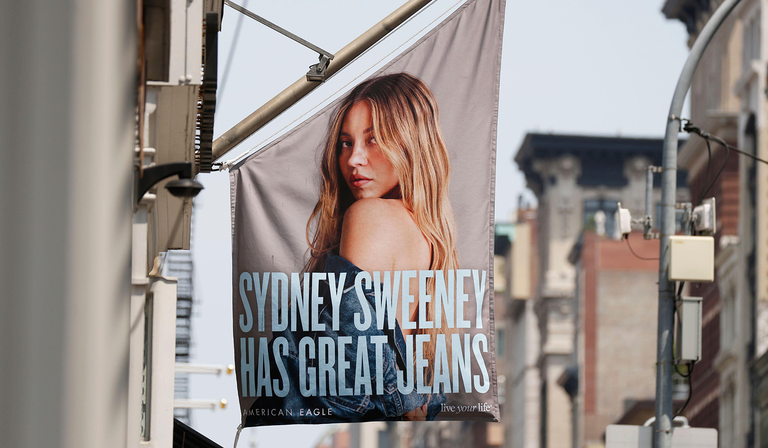It’s almost a year since Donald Trump made a campaign trail appearance on the Hugh Hewitt radio show and made the casual remark that undocumented migrants who commit murder have “bad genes”. It wasn’t his first pronouncement on the subject, of course, but it was blunt enough to make many wonder whether we might be entering a new age of biological determinism and racial hierarchy.
So when the actress Sydney Sweeney was recently unveiled as the new face of the clothing company American Eagle, her maiden advertisement caused uproar: Sweeney, in repose, is captured wriggling, buttoning, zipping her way into a pair of denims, as she murmurs: “Genes are passed down from parents to offspring, often determining traits like hair colour, personality, and even eye colour.” Some two, three seconds pass. The camera comes to settle on Sweeney’s eyes. “My jeans are blue,” she says. Off-camera, a male voice provides the tagline: “Sydney Sweeney has great genes.”
A few decades ago, this might not have prompted much consternation. But, in these heightened days, the hiring of a blonde-haired, blue-eyed, registered Republican actor for a campaign that rests on the homophonic tension between “jeans” and “genes” was unsettling.
As the debate raged across the media, ranging from the role of indigo in the slave trade to soft eugenics, via the left’s supposed dreary inability to take a joke, Trump posted to Truth Social that Sweeney’s campaign was “The HOTTEST ad out there,” and took a few additional swipes at “woke” advertising (Jaguar, Bud Lite) and Taylor Swift (“NO LONGER HOT”). Meanwhile, American Eagle’s stock price surged.
I mention this story of the actress, the president and the controversial ad campaign in a pop music column because this kind of cultural shift percolates into mainstream society through various means—among them music—and it does so in a way that can be barely perceptible.
In recent weeks, I’ve thought often about a 2019 article in the New Yorker on the subject of “Instagram Face”—that is, the dominance of a particular aesthetic, evident particularly in the selfie-dominated realm of social media. The magazine described the look as “distinctly white but ambiguously ethnic” and traced its lineage to an amalgamation of the Kardashians, the Hadids, FaceTune and the cosmetic injector’s office.
I’ve wondered, of course, whether Sweeney’s American Eagle campaign is a riposte to that aesthetic—unambiguously white, with the insistence that her good looks are down to genetics, not clever photo editing or beauty tweakments. And I’ve wondered, too, whether we might inevitably witness something similar in the music world.
For weeks now, Alex Warren’s “Ordinary” has been the best-selling song in the US. It’s a secular hit wearing spiritual trousers—anthemic, in a vague way, and rich with Christian subtext. Meanwhile, Morgan Wallen has reigned over the album charts, with a 37-track country pop epic that touches on drinking, desire, lost love, gun ownership and the general lunacy of the world right now.
There’s a blurry homogeneity to the sound of both Wallen and Warren. Neither feels distinctive as either songwriter or vocalist; they sound simply white and American—sprawling IHOP/Waffle House/gas station songs, simultaneously everywhere and nowhere. It feels silly to cite such indistinct music as a marker of cultural change. And yet, its dominance also feels representative of something.
A mid-year analysis of the Hot 100 charts found country music surging past both rap and pop
While hip-hop has been the most popular musical genre in the US since 2017, this year, a Billboard mid-year analysis of the Hot 100 charts found country music surging past both rap and pop. To the casual onlooker, country might seem increasingly diverse—last spring, for instance, came the release of Shaboozey’s “A Bar Song (Tipsy)”, which would become the Billboard Hot 100’s joint longest-running number one of all time. It succeeded Beyoncé’s “Texas Hold ’Em” in the number one spot on the country charts, making it the first time two black artists had topped the country charts in consecutive weeks.
But the truth is less diverse. In 2024, songs by women made up just 8.4 per cent of airplay on country format radio in the US, and 0.1 per cent were songs by black women. Meanwhile, Beyoncé’s critically acclaimed, platinum-selling Cowboy Carter album—an exploration of Americana focusing on the overlooked contributions of black artists—single-handedly introduced 36m new listeners to the country music genre but stood unnominated at the year’s Country Music Awards. (Wallen, however, scored Entertainer of the Year, his career having somehow righted itself after he was filmed using a racial slur three years earlier.)
A few weeks earlier, it just so happened that Beyoncé also appeared in a denim commercial. A reconjuring of Levi’s infamous 1985 ad featuring Nick Kamen stripping down in a launderette, this new version showed the singer in a pair of white boxer shorts as her jeans spun about in the washing machine. The slogan for this campaign was the word “reimagine”—its message that few things are set in stone or predetermined; not musical genres or the path of one’s life; that greatness is there for us all.












